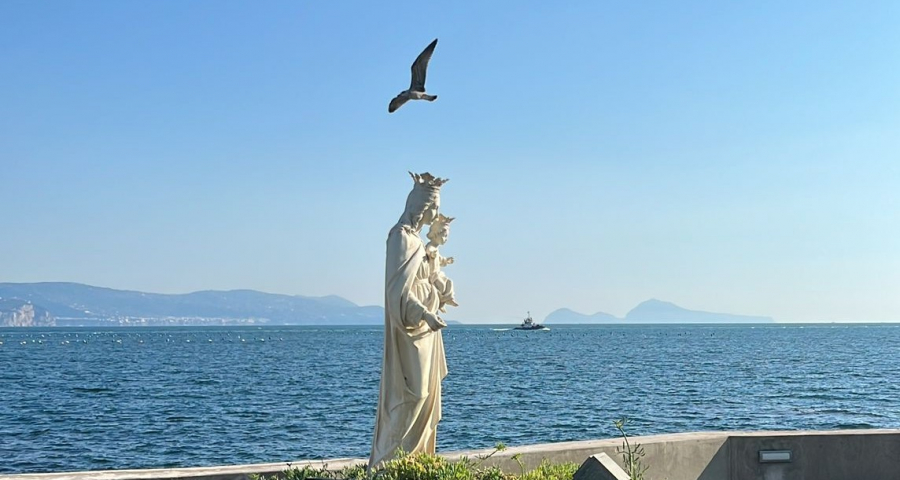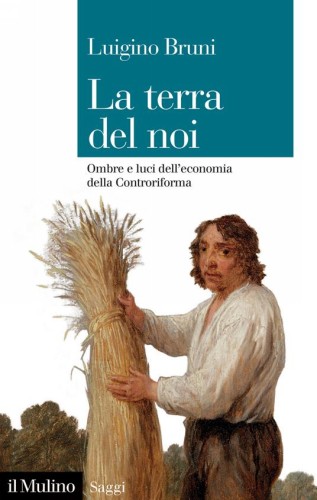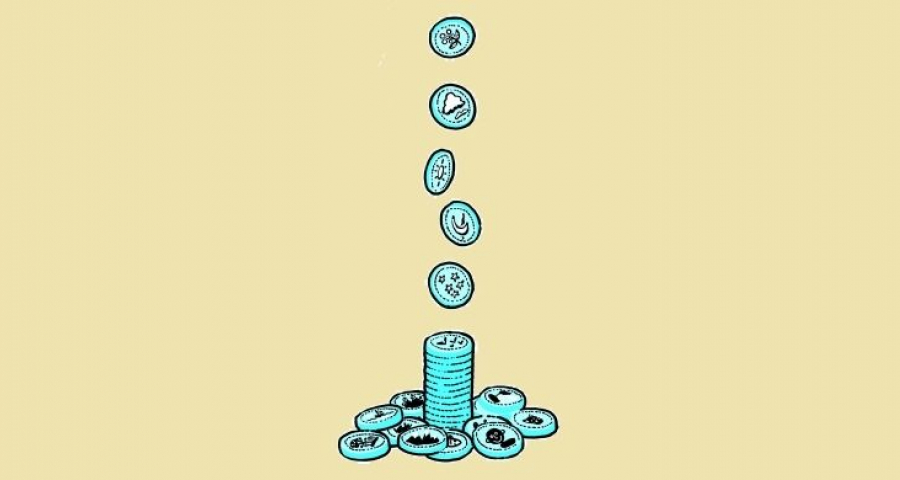The mystery revealed/17 - The Lord is the first guarantor of the truth and freedom of human history
By Luigino Bruni
Published in Avvenire 24/07/2022
But the humble will inherit the earth and enjoy the pleasure of much peace. His interpretation: the assembly of the poor who accept the established time of affliction will be freed from all pitfalls.
The Dead Sea Scrolls of Qumran, Commentary on Psalm 37
The relationship between religion, history and free will is one of the great themes of faith and culture, and in the eleventh chapter of the Book of Daniel, where unexpected passages await us as well.
If the score of history was already written in heaven and we were just its performers, or if the score was not at the very least a jazz score, where the performers have a free and creative role, the world would be a show in which we would all be just like young Truman, with the exception of God who created our set and spends his time watching a play identical to the one he wrote. The positive replies and yes from Abraham and Jeremiah would also ring false, as would the scene of Mount Moriah, the justice of Noah and the loyalty of Joseph the Egyptian. David's sin with Uriah, Rizpah's vigil over the bodies of his children and his pain, would also be false. God's repentances would also be fiction. The abandonment of the crucifix of Golgotha and of all brothers and sisters crucified would be mere theater. God would never be surprised, the loyalty of Daniel and his friends, our silent loyalties, our infidelities, not even that of Judas, would tell him nothing; and the millions of years of life on earth and the millennia of human history would not add even a comma to the book of truth that God keeps close to his chest. Everything would be terribly boring, we would not be free, our actions would have no ethical value, and the first being to be bored would be God.
«But first I will tell you what is written in the Book of Truth» (The Book of Daniel 10,21). The "book of truth" is a common expression in Jewish apocalyptic literature and, in various versions, also in other Middle Eastern mythic literature. In the Book of Daniel the past and the future are intertwined, because the events that appear in the text as both prophecy and future (and hence written in future tense), to the author who is writing the book these events are already news. Let us not forget that Daniel's stories are set in the 6th century BC, while its author wrote the book during the second century. However, his narrative fiction is based on a theological vision: human history is already written in the "book of truth" which can be found with God. We discover this history as we live it, the prophets foresee some passages of it, but it is a process of discovering what has already been decided and that is the only way it can be.
However, this bizarre theology of predestination has had quite an influence on European history. First of all, because this archaic idea of destiny has never really left popular piety. It is a simple interpretation that everyone understands, and which serves to console or alleviate many inconsolable pains ("it was destiny" ... "it was destined to be so"). The need for consolation during times of misfortune is a primary human need, perhaps a fundamental right of ours, so much so that we produce a whole array of false consolations in order not to die. The great sociologist Max Weber taught us that without the Calvinist version of the theology of predestination we would not have had this capitalism or we would, but a different version of it. According to him, the anguish of the possibility of finding oneself among those predestined for hell, and the theological certainty that followed with it, namely that good works can do nothing to change what is already written in the "book of truth", made us interpret success in business as a sign that, perhaps, our own name was among those of the chosen few. A concept that is now popular again thanks to the so-called "gospel of prosperity". The Bible is much more than just religion: it is history, it is culture, and it is the root where the "brain" of our tree can be found. However, in order to fully understand it and benefit from its consequences (studying it at school as great literature, for example) would take a true form of secularism that just isn’t there.
Hence, we must not take the doctrine of the "book of truth" contained in the Book of Daniel too seriously, because if we did, we would end up denying the most beautiful parts of the very same book. Instead, it must be read as a narrative device that is naturally a result of the religion of the time, but that in any case also wishes to tell us something important: human history is not left to the domain of chance or chaos. There is a red thread of love that guides all events, conceived and wanted for our salvation, human affairs are held in the palm of the hand of Providence. Today we know that God writes the "book of truth" together with us, and he writes it while our life is fulfilling (neither before nor after), because God is the first guarantor of the truth of human history, he is the first sentinel of our non-false freedom. Chapter 11 in the Book of Daniel leafs through that book in the heavens, and begins to read the events that go from the end of the Babylonian empire to "Romans" to us (Daniel 11.30), repeating, in the form of a chronicle, the stories it had told us in the first chapters through the language of visions and symbols (statue of metals and beasts). It is not difficult to understand the effect that these passages have had for many centuries on both Jews and Christians, who read this historical narrative as a prophecy and perfect forecast of future events: this ignorance and naivety also created the splendor of Europe, our art and our literature, and have given our ancestors beautiful dreams, certainly more beautiful than our disenchanted and colorless dreams today.
It is interesting to note how that school of scribes who wrote the Book of Daniel introduces us to Alexander the Great (Daniel 11,3-5). Official history shows him as the one who spread the great Greek culture in a large part of the known world (Aristotle had been his tutor), creating that koine which, among other things, also favored the development of Christianity centuries later. In Daniel’s eyes however, there was nothing good in that domination. In the Bible, Alexander is just a power-hungry ruler. Those who dominate and expand their empire can sometimes also be moved (in part) by the conviction of having to export superior values and civilization, but for the occupied people there is only oppression, violence and the will to wield power. The Bible, then, is also a great ethical exercise in history written by the defeated, it is the world seen from the perspective of the victims - today it should be the young who judge the successes of capitalism and the capitalist empire. Perhaps where we see progress, they would above all see a devastated planet and shortened future horizon. Over the centuries, the biblical books have become the words of threatened prophetic minorities, sacred books with which to initiate a liberation.
Even the writing of the Book of Daniel, composed or completed in some remote cave where groups of faithful Jews took refuge during the persecution of Antiochus IV Epiphanes, was an exercise in spiritual and civil resistance against an empire that wanted to eliminate or assimilate them to the great Greek culture. It has been picked up throughout history, by other communities who tried to resist and not die in the face of new empires - perhaps even today, in Ukraine, Myanmar, Nigeria or Palestine, new human communities are finding words to continue to hope and believe in salvation in the pages in the Book of Daniel.
Indeed, towards the end of the account of "past" events - the wars and alliances between Hellenists (Seleucids) and Egyptians (Ptolemies), the author of the book describes his historical present, and here we encounter a reference to the same community that was writing those pages, and therefore to the conflict, among the Jews themselves, between those who collaborated with the Greeks and those who tried, amidst persecutions, to remain faithful: «With flattery he will corrupt those who have violated the covenant… Those who are wise will instruct many, though for a time they will fall by the sword or be burned or captured or plundered… Some of the wise will stumble, so that they may be refined, purified and made spotless until the time of the end, for it will still come at the appointed time» (Daniel 11,32-35). Anyone who writes books knows that the most difficult pages are those where the author breaks into the scene, becoming a character among his characters. They are rarely happy pages, due to the lack of lightness. The greatest books are those where the author enters the pages he writes and we, the readers, ask him not to go away: as in some masterpieces of the Italian Renaissance, where the presence in a detail of the painter's face only increases the splendour. Finally, within the long narrative of centuries of struggles and political intrigues of men, we find two women, two queens who remain anonymous in the Book of Daniel. The first is Berenice (282-246 BC), an Egyptian. She was given in marriage by her father Ptolemy II to Antiochus II (Greek). Antiochus repudiated his wife Laodice, but upon Ptolemy's death, Antiochus took her back with him and repudiated Berenice, and then Laodice had both Antiochus and Berenice killed along with her own child: «But she will not retain her power, and he and his power will not last. In those days she will be betrayed» (Daniel 11,6). The second one is Cleopatra (215-176 BC), not to be confused with the more famous Cleopatra, lover of Marc Antony. She was the daughter of Antiochus III, who gave her in marriage to the Egyptian Ptolemy V in the hopes of «overthrowing the kingdom» through his daughter, but Daniel continues «his plans will not succeed or help him» (Daniel 11,17).
Two other women hidden in the Bible, two anonymous women to whom I wanted to give a name. The former, like many other women, is used as a political bargaining chip, the victim of court intrigues. Yet another woman-victim, the dominant female role in the Bible. We cannot leave the biblical reading as innocent readers if we do not also take time to dwell on these victims as in front of a tombstone. The second one reveals another element that we often find when women enter the Bible. Things will not work out: Cleopatra became loyal to her new Egyptian family, and blew up the political plans. That woman did not perform the score that her father had written for her, she went beyond the little fence of freedom that the males of her society had marked for her, her ethical home was bigger than her natural oikos. Like Abigail, like the mother of the child resurrected by the prophet Elisha, like Michal the wife of David. Like Mary, like the woman of Tekoa, like the midwives of Egypt: «The midwives, however, feared God and did not do what the king of Egypt had told them to do; they let the boys live» (Exodus 1,17). It has never been easy to use men as mere executors of death plans written by the powerful because, simply put, we are ethical matter, and therefore freedom will always be a temptation that can become invincible. However, it is even more difficult to use women to this end, because their natural alliance with life protects them from these plots of death. Many "things" still continue to "not work or fail" because a woman decides not to play the score already written for her. And thus, they even end up surprising God.






